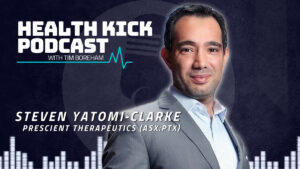Prescient’s work is being considered a game-changer in advancing CAR-T therapies for cancer treatment and its leader believes its recent momentum is just the beginning.
You can sense the excitement in the voice of Prescient Therapeutics (ASX:PTX) CEO and managing director Steven Yatomi-Clarke.
It’s been a milestone few months for Prescient, which has a broad pipeline of personalised cancer treatments, comprising CAR-T and targeted therapies to address various cancers.
Prescient’s two platform cell technologies – OmniCAR and CellPryme – address challenges confronting current-generation CAR-T therapies.
They aim to create next-generation CAR-T therapies that are more effective, safer, controllable, targeted, and cost-efficient.
Both platforms, along with the company’s inhouse cancer therapies, have been developed by or with world-leading cancer research institutions including Oxford, UPenn and Peter MacCallum Cancer Centre, with IP rights exclusively owned by Prescient.
Yatomi-Clarke took over the reins of Prescient in 2016 and has overseen its progression from its early days. He manages a team in Australia and the US and has been instrumental in turning the strategy of the company whilst progressing its existing assets, requiring strategy development, licensing, initiating and managing clinical trials, fundraising and business development.
“I am so excited that I can barely control myself,” Yatomi-Clarke said.
“As CEOs and scientists, we live for these types of moments, and you can go for decades without getting the traction.”
“But we are seeing not only the convergence of our data looking very encouraging but also this window of opportunity where we have a distinct advantage and ability to change the game.”
He said the last two years have been transformative for Prescient and he expects the next 12 to 24 months will be just as momentous.
“Where it’s been incremental until now, we’ve got the ability to really move the needle and take a leadership position in this field,” he said.
Prescient joins with Q-Gen to produce OmniCAR T-cells for clinical trials
Prescient has entered a manufacturing services deal with specialist cell therapy manufacturer Q-Gen Cell Therapeutics (Q-Gen) to produce its OmniCAR cell lines for upcoming clinical trials.
Q-Gen is the cell therapy manufacturing arm of the world-renowned QIMR Berghofer Medical Research Institute in Brisbane and is one of Australia’s approved producers of cell-based medicines.
As Prescient advances development of its next-generation OmniCAR programs for acute myeloid leukaemia (AML), Her2 positive solid cancers and glioblastoma multiforme, the encouraging progress of the OmniCAR AML program makes it likely to be the first OmniCAR program to enter clinical studies.
“Cell therapy is probably one of the hardest medicines to manufacture. As a “living medicine” you have to get it right and Q-Gen is one of two manufacturers in Australia licensed to manufacture cells for human trials,” Yatomi-Clarke said.
“They are also going to be using our other secret sauce CellPryme-M to make a more youthful and effective cell product.”
Game-changing therapies
Yatomi-Clarke said OmniCAR could be a game-changer because current therapies are very static.
“Current CAR-T therapies address one particular marker on a cancer and that’s wonderful for the cancer cells that have that marker,” he said.
“But cancers express a whole range of different markers or so-called antigens on the surface and that’s one problem that needs to be overcome.”
He said another problem is the therapies need to be controllable by doctors post-infusion so they’re safer and adaptable for patients.
“If you were to take any other medicine and had a bad side effect, your doctor would cut it back or stop it altogether,” he said.
“But with current CAR-T, you’ve been injected with a living therapy that continues to grow and divide, so not only can it not be stopped but it can get worse and worse which is why these CAR-T therapies can be quite dangerous. As a result, CAR-T is only reserved for very ill patients with nothing to lose. A safer therapy could benefit many more patients.”
Controlling CAR-T therapy post-infusion
Where Omni-CAR changes the game is making the CAR-T therapies controllable post-infusion.
“You can control the activity up or down or switch it off and go back to switch it on again later if you need,” Yatomi-Clarke said.
“More importantly you can treat these living cells like a LEGO set plugging on one, two, three, four etc different binders to attack different types of cancer so there’s nowhere for it to hide and that’s what makes it a game-changer.
“There are many other advantages to being able to work with third parties to basically create an app store if you like, where everyone can put their binders or cells into the app store. That’s never been done in medicine before.”
Capital raise to progress pipeline
To progress its deep pipeline of innovative cancer therapies, Prescient has announced a capital raise.
The company is looking to raise $8 million in funds via a Share Purchase Plan at 17.5 cents/ share to maintain momentum on its impressive cancer pipeline.
“The reason we are raising capital now, even though we don’t need it, is to maintain the incredible momentum we’ve got,” Yatomi-Clarke said.
“Assets like these deserve to be resourced appropriately so we can stay at the front of the wave. It would be a shame to have to slow down; we actually want to go faster and bring these ground-breaking therapies to cancer patients as soon as possible.”
Join a briefing
Join Prescient Therapeutics CEO Steven Yatomi-Clarke on Wednesday 7th September at 12pm (AEST) where he will discuss the company’s deep pipeline and provide an update on activities. Click here to register.
This article was developed in collaboration with Prescient Therapeutics, a Stockhead advertiser at the time of publishing.
This article does not constitute financial product advice. You should consider obtaining independent advice before making any financial decisions.
This article also appeared on The Australian.
You might be interested in












